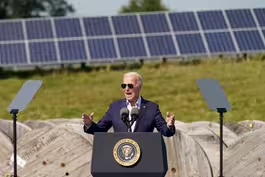
How Glacier National Park is navigating a flood of visitors
Clip: 9/21/2024 | 6m 34sVideo has Closed Captions
How Montana’s Glacier National Park is navigating a flood of visitors and vehicles
Glacier National Park in Montana attracts millions of visitors a year. Officials began a vehicle registration program in 2021 to try to ease congestion, but there have been unintended consequences for visitors and local businesses. Aj Williams of Montana PBS reports.
Problems playing video? | Closed Captioning Feedback
Problems playing video? | Closed Captioning Feedback
Major corporate funding for the PBS News Hour is provided by BDO, BNSF, Consumer Cellular, American Cruise Lines, and Raymond James. Funding for the PBS NewsHour Weekend is provided by...

How Glacier National Park is navigating a flood of visitors
Clip: 9/21/2024 | 6m 34sVideo has Closed Captions
Glacier National Park in Montana attracts millions of visitors a year. Officials began a vehicle registration program in 2021 to try to ease congestion, but there have been unintended consequences for visitors and local businesses. Aj Williams of Montana PBS reports.
Problems playing video? | Closed Captioning Feedback
How to Watch PBS News Hour
PBS News Hour is available to stream on pbs.org and the free PBS App, available on iPhone, Apple TV, Android TV, Android smartphones, Amazon Fire TV, Amazon Fire Tablet, Roku, Samsung Smart TV, and Vizio.
Providing Support for PBS.org
Learn Moreabout PBS online sponsorshipJOHN YANG: Glacier National Park in Montana attracts millions of visitors a year.
Three years ago, officials began a vehicle reservation program to try to ease congestion of both people and vehicles, as AJ Williams of Montana PBS reports, there have been unintended consequences.
AJ WILLIAMS (voice-over): For the last five years, Glacier National Park's visitation numbers have hit record highs, but the increase to 3 million park goers has led to overcrowding in popular areas, and the traffic they bring has led to safety concerns.
DAVID ROEMER, Superintendent, Glacier National Park: Glacier is a very special place.
It's natural that people want to come here, but if there's too many people in the park, then the park experience becomes one that just won't be enjoyable.
AJ WILLIAMS (voice-over): In the last four years, the park has been piloting a vehicle reservation system for traveling through glaciers, most congested areas.
Glacier National Park Superintendent Dave Roemer says that they use monitoring across the park with cameras and traffic counters to inform their decisions, as well as staff observations and hearing from the broader glacier community.
This year comes with some substantial changes.
DAVID ROEMER: We've changed the hours of the Vigla reservation system from 6:00 a.m. to 3:00 p.m. and that's consistent throughout all the areas.
AJ WILLIAMS (voice-over): Locals say this is an improvement, but for those without a vehicle reservation, entering mid-afternoon still doesn't necessarily afford getting far into the park.
LUCINDA CRISTLER, Owner, Mini Golden Inns: If they want to do a long day hike, that's not going to work.
You know, you need to be up there really early in the morning, and I find a lot of my guests are leaving really early in the morning to beat that, as is everybody else who doesn't have a ticket.
This is probably most people's favorite.
AJ WILLIAMS (voice-over): Lucinda Cristler is the owner operator of Mini Golden Inns just outside of glaciers, west entrance.
She took over the family business five years ago, just before the pandemic hit.
And despite the park's drastic increase in visitors, Cristler has seen a decline in revenue since the vehicle reservation system has been put in place.
LUCINDA CRISTLER: It has affected me in a negative way, revenue wise, because of occupancy rates, mostly with cancelations, or more than that, even people cutting their trip short, even though I've been here living solid since 2019 I've only been to the park four times, and that was in the off season after the tickets were no longer required because I simply couldn't get him.
My window of opportunity sometimes I only know an hour in advance if I can get away, and that leaves me out.
And I hear that from a lot of other locals too.
AJ WILLIAMS (voice-over): After reviewing data and receiving input from the Blackfeet Nation Tribal Council as well as local businesses, the park opted to keep two of the east side entrances out of the vehicle reservation system.
DAVID ROEMER: So we've got two options there on the east side where people will be able to visit the park in an impromptu, unplanned fashion, without needing to obtain vehicle reservations every day.
AJ WILIAMS (voice-over): Flathead County Commissioner Brad Abell believes vehicle reservations are still needed on the west side entrances near his district.
BRAD ABELL, Flathead County Commissioner: Everybody's concerned about waiting in a line where you're you're kind of trapped there in the middle of traffic.
AJ WILLIAMS (voice-over): Because of these concerns in part, the park decided to change where vehicle reservations begin when entering from the west side, but Abell says local businesses expressed that they experienced financial loss due to the reservation system.
BRAD ABELL: I have heard from the businesses that are inside the park.
They did have concerns about the ticketed entry, because those people could not get in to do business with their businesses.
And the ticketed entry, people were kind of going right straight on through and those businesses were suffering.
AJ WILLIAMS (voice-over): Another change for this season is when you can book vehicle reservations.
Before, reservations could be made 8:00 a.m. the day of entry.
Now they can be made 7:00 p.m. the night before.
DAVID ROEMER: I think that's a change that is going to be beneficial to both people that live locally, 7:00 p.m. is outside of your work hours, and for people planning a trip, just plan your dinner around that 7:00 p.m. hour.
AJ WILLIAMS (voice-over): The vehicle reservations now last one day instead of three, which will cut down on unused reservations and increase availability.
Cristler says, as a business that provides lodging to park goers, the vehicle reservation system puts another burden on her to educate every customer to navigate the system.
LUCINDA CRISTLER: A lot of people have problems navigating that internet system, and they want a voice to talk to, and oftentimes that voice ends up being me, which I don't want to complain about that, but it does take a lot of time to explain that system to them, a system that I'm not even really fully 100 percent, you know, an authority on.
AJ WILLIAMS (voice-over): But she expects the system to smooth out and hopefully for the visitor experience to get better over time.
And as a resident, she hopes that the park will work better with the locals to make sure that they can enjoy the park itself.
LUCINDA CRISTLER: I think that it's really important that the powers that be that make these rules be aware of how upsetting it is for a lot of Montanans who this is their backyard and they can't even enjoy it.
That's unfortunate, and I don't know what the answer is, but you know, there should be something done that would allow these people access.
DAVID ROEMER: People are still going to come to Glacier and they're still going to enjoy glacier, but we've removed those peaks, those high points where things get really congested, unsafe and non-enjoyable, not conducive to a park experience.
That's going to be inspiring.
It's going to be educational, that could be spiritual.
All the things that people come to Glacier for you can't experience that in good luck traffic.
AJ WILLIAMS (voice-over): As glacier enters year four of piloting its vehicle reservation system, visitors will be the judge of what changes work.
WOMAN: Hi.
Welcome to Glacier.
AJ WILLIAMS (voice-over): For PBS News Weekend.
I'm AJ Williams.
A 2-year progress report on Biden’s Inflation Reduction Act
Video has Closed Captions
Clip: 9/21/2024 | 7m 14s | A look at the economic impact and progress of Biden’s Inflation Reduction Act so far (7m 14s)
Rise in extreme heat threatens children’s health worldwide
Video has Closed Captions
Clip: 9/21/2024 | 5m 40s | How a rise in extreme heat threatens the health of young children worldwide (5m 40s)
Providing Support for PBS.org
Learn Moreabout PBS online sponsorship
- News and Public Affairs

FRONTLINE is investigative journalism that questions, explains and changes our world.

- News and Public Affairs

Amanpour and Company features conversations with leaders and decision makers.












Support for PBS provided by:
Major corporate funding for the PBS News Hour is provided by BDO, BNSF, Consumer Cellular, American Cruise Lines, and Raymond James. Funding for the PBS NewsHour Weekend is provided by...


